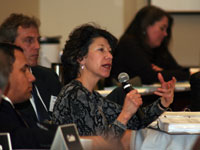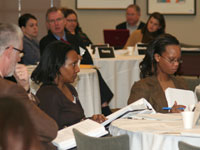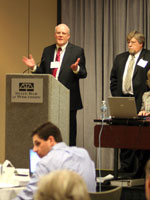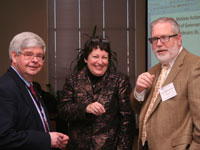Board of Governors discusses mandatory/voluntary bar report, takes other actions

Marsha Mansfield, Madison, addresses the board during its discussion related to the Strategic Planning Committee's resolution regarding the State Bar's mandatory status.
Feb. 26, 2010 – At its meeting today, the State Bar’s Board of Governors (BOG) discussed a resolution drafted by the Strategic Planning Committee (SPC) to petition the Wisconsin Supreme Court “to review the status of the integrated bar.”
The committee proposed the resolution as part of its Future of the State Bar: Mandatory/Voluntary Membership Report, which SPC Chair John Macy presented to the BOG for discussion. The resolution will come before the BOG for action at its May 5 meeting.
Macy outlined the committee’s process – stressing that the extensive input it received from members was essential to the report’s content and the committee’s ultimate proposals. He explained that as the SPC reviewed and discussed comments, it became clear that the underlying issue of the State Bar’s status as a mandatory or voluntary organization can be viewed from four distinct perspectives:
the legal issues;
individual member perspectives;
overall membership preferences; and
best interests of the association.

During the meeting, Lynnette McNeely, Milwaukee (front, right), was elected to the board; she succeeds William Domina.
He said it is possible to judge the merits of the issue differently depending on how much weight is given to these different perspectives.
Macy also told the BOG that, based on the committee’s review of bars in other states, posing the issue as a choice between a “mandatory versus voluntary bar” understates the complexity of the challenge because there is a wide spectrum of mandatory and voluntary bar models in terms of structure, scope of activities, and other critical features.
Input from members helped guide the committee toward a consensus position, reflected in the proposed resolution, Macy said. He noted that the prospects for a unanimous recommendation from the SPC, which includes both mandatory and voluntary bar supporters, looked improbable when the committee began its deliberations, but a shared perspective emerged as the panel considered its choices from the four perspectives noted above.
These perspectives are reflected in the proposed resolution:

Ed Hannan (at podium), OLR Board of Administrative Oversight, and Dean Dietrich (right), State Bar Ethics Committee, discuss a proposed petition to establish standards and procedures for permanent license revocation. The board moved to oppose the petition.
Resolution Regarding the Integrated (Mandatory) Status of the State Bar of Wisconsin
WHEREAS, the issues surrounding the legality of the integrated bar have a long history dating from 1943 to present, involve volumes of decisions in all levels of courts on complicated concepts balancing the integrated nature of the State Bar of Wisconsin, and have been subject to periodic review; and
WHEREAS, individual members of the State Bar hold diverse opinions on whether bar membership should be voluntary or mandatory; and
WHEREAS, a significant number of the members of the State Bar are asking that the status of the integrated bar be reviewed by the Supreme Court; and
WHEREAS, the Strategic Planning Committee has studied the issue, has produced the attached report, and has concluded that it is in the interest of the State Bar that the Wisconsin Supreme Court review the status of the State Bar as an integrated organization.
NOW THEREFORE, BE IT RESOLVED, by the Board of Governors of the State Bar of Wisconsin as follows:
1. That the report of the Strategic Planning Committee attached to this resolution is accepted and placed on file; and
2. That the Wisconsin Supreme Court be asked to review the status of the integrated bar; and
3. That the Strategic Planning Committee is authorized to draft and to file two or more petitions with the Wisconsin Supreme Court requesting that it review the status of the integrated bar and whether it should be modified or made voluntary; and
4. That all members of the Board of Governors are invited to participate in drafting and advancing the respective petitions.
By unanimous consent, the BOG accepted the report and placed it on file. The BOG discussed the merits of additional steps, with an emphasis on the sequence of events that would lead to the development of a State Bar petition or petitions.
A record of all comments received by the Strategic Planning Committee as part of its work on the report, together with links to detailed resource and background materials, are located on the SBW website at www.wisbar.org/stratplancomm.
Other business

Mike Kernats, Government Lawyers Division representative, and State Bar Past President Diane Diel congratulate former governor William Domina on his recent appointment to the Waukesha County Circuit Court. Domina resigned from the Board of Governors after accepting Gov. Doyle's appointment.
In other business, the governors took the following actions.
• Public policy position in favor of adequate district attorney funding. The board approved by a vote of greater than 60 percent to amend its existing public policy position in favor of “general purpose revenue for additional staff necessary to maintain reasonable caseloads” in district attorney offices around the state. The board approved amending the policy to support “adequate funding for additional staff necessary” to maintain reasonable caseloads, so that the policy is not limited to general purpose revenue or GPR. (GPR are revenues limited to sources such as individual and corporate income taxes and the sales tax.)
• Judicial Council petition regarding communications in mediation. The board unanimously voted to support rules petition 09-12, filed by the Judicial Council to amend Wis. Stat. section 904.085(4)(3). That statute currently allows courts to admit communications made in mediation “if necessary to prevent a manifest injustice of sufficient magnitude to outweigh the importance of protecting the principle of confidentiality in mediation proceedings generally.” The Judicial Council petition would require the hearing to make such determinations be held in camera. The State Bar’s Alternative Dispute Resolution Section requested that the board support the petition.
• Taxation Section request for authorization to file an amicus brief. The board approved by a vote of greater than 60 percent the request of the State Bar’s Taxation Section to file an amicus brief in Metropolitan Associates LP v. City of Milwaukee, 2009AP000524, which is pending before the supreme court. The Real Property, Probate and Trust Section also supported the request but is not joining in the amicus.
• Keller dues reduction amount. The board approved the Finance Committee’s proposed Keller dues reduction amount of $10.25 for the 2011 fiscal year State Bar dues.
• Petition for permanent license revocation. The board opposed a petition by the Office of Lawyer Regulation to ask the Wisconsin Supreme Court to create rules to allow for the permanent revocation of an attorney’s license for misconduct in egregious cases. Currently, a revoked attorney may petition the court for reinstatement after five years.
• Petition to dissolve Lawyer Assistance Corporation. The board unanimously approved filing a petition with the supreme court to amend rules in SCR 12 to abolish the Lawyer Assistance Corporation (LAC). The LAC was established as a nonstock, nonprofit corporation to provide malpractice insurance to attorneys appointed to unwind the affairs of abandoned law practices. The corporation has proven unnecessary because the required insurance is provided under the State Bar’s auspices.
• Election of successor to Governor William Domina. The board unanimously elected Lynnette McNeely, Milwaukee, to serve the remainder of former Governor William Domina’s term, which ends June 30, 2011. In January 2010, Gov. Jim Doyle appointed Domina as a circuit court judge in Waukesha County. SCR 10.03 prohibits members of the judiciary from serving as officers or governors of the State Bar. The board also elected Governor Kelly Nickel, Delevan, to succeed Judge Domina on the board’s Executive Committee.
• CLE committee proposed policy regarding political activity at State Bar events. The board returned to the CLE Committee for further work a proposal to establish a policy regarding political activity at State Bar events. Several governors expressed concern that the policy as proposed may create First Amendment issues.
• Approval of date and place of 2011 Annual Convention. The board approved holding the 2011 annual convention at the Kalahari Resort in Wisconsin Dells on June 8-11, 2011.
Former State Bar president Tom Basting, a member of the Bar’s UPL Policy Committee, urged board members to contact the Wisconsin Supreme Court in support of the Bar’s UPL petition 07-09, which is scheduled for a public hearing on March 8, 2010, at 9:45 a.m.
